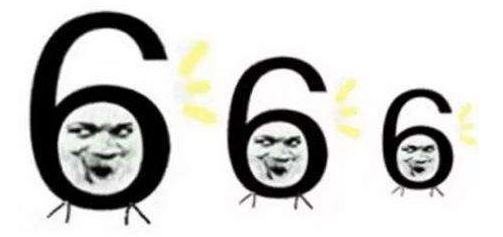L1-058 6翻了(Java)
发布时间:2024年01月20日

“666”是一种网络用语,大概是表示某人很厉害、我们很佩服的意思。最近又衍生出另一个数字“9”,意思是“6翻了”,实在太厉害的意思。如果你以为这就是厉害的最高境界,那就错啦 —— 目前的最高境界是数字“27”,因为这是 3 个 “9”!
本题就请你编写程序,将那些过时的、只会用一连串“6666……6”表达仰慕的句子,翻译成最新的高级表达。
输入格式:
输入在一行中给出一句话,即一个非空字符串,由不超过 1000 个英文字母、数字和空格组成,以回车结束。
输出格式:
从左到右扫描输入的句子:如果句子中有超过 3 个连续的 6,则将这串连续的 6 替换成 9;但如果有超过 9 个连续的 6,则将这串连续的 6 替换成 27。其他内容不受影响,原样输出。
输入样例:
it is so 666 really 6666 what else can I say 6666666666输出样例:
it is so 666 really 9 what else can I say 27解题思路
这个问题属于字符串处理的范畴,特别是涉及到查找和替换特定模式的字符串。在这个具体问题中,我们需要识别连续的 '6' 字符串,并根据它们的长度来进行相应的替换。
解决这个问题的关键步骤包括:
- 遍历字符串并计数连续的 '6' 字符。
- 根据连续 '6' 的数量决定替换策略:
-
- 超过 9 个连续的 '6' 替换为 "27"。
- 超过 3 个但不超过 9 个连续的 '6' 替换为 "9"。
- 3 个及以下的连续 '6' 保持不变。
- 生成最终的字符串。
特别是在这段代码当中,如果currentChar == '6'时,这时候是不进行append的,而是count++,让lastChar = currentChar。直到currentChar != '6'时才进else判断当中去看6的数量是不是超过3个或者9个,如果没有的话才进行一个append
for (int i = 0; i < input.length(); i++) {
char currentChar = input.charAt(i);
if (currentChar == '6') {
count++;
} else {
if (lastChar == '6') {
if (count > 9) {
result.append("27");
} else if (count > 3) {
result.append("9");
} else {
for (int j = 0; j < count; j++) {
result.append('6');
}
}
}
result.append(currentChar);
count = 0;
}
lastChar = currentChar;
}解题过程中遇到的问题
暂无
代码
import java.util.Scanner;
public class Main {
public static void main(String[] args) {
Scanner scanner = new Scanner(System.in);
String input = scanner.nextLine();
String output = translateExpression(input);
System.out.println(output);
}
public static String translateExpression(String input) {
StringBuilder result = new StringBuilder();
int count = 0; // 用于计数连续的 '6'
char lastChar = '\0'; // 保存上一个字符
for (int i = 0; i < input.length(); i++) {
char currentChar = input.charAt(i);
if (currentChar == '6') {
count++;
} else {
if (lastChar == '6') {
if (count > 9) {
result.append("27");
} else if (count > 3) {
result.append("9");
} else {
for (int j = 0; j < count; j++) {
result.append('6');
}
}
}
result.append(currentChar);
count = 0;
}
lastChar = currentChar;
}
// 处理字符串末尾的连续 '6'
if (lastChar == '6') {
if (count > 9) {
result.append("27");
} else if (count > 3) {
result.append("9");
} else {
for (int j = 0; j < count; j++) {
result.append('6');
}
}
}
return result.toString();
}
}
文章来源:https://blog.csdn.net/Gracener/article/details/135711857
本文来自互联网用户投稿,该文观点仅代表作者本人,不代表本站立场。本站仅提供信息存储空间服务,不拥有所有权,不承担相关法律责任。 如若内容造成侵权/违法违规/事实不符,请联系我的编程经验分享网邮箱:chenni525@qq.com进行投诉反馈,一经查实,立即删除!
本文来自互联网用户投稿,该文观点仅代表作者本人,不代表本站立场。本站仅提供信息存储空间服务,不拥有所有权,不承担相关法律责任。 如若内容造成侵权/违法违规/事实不符,请联系我的编程经验分享网邮箱:chenni525@qq.com进行投诉反馈,一经查实,立即删除!